
Melissa Ann Hart is an American lawyer and politician. She was a Republican member of the United States House of Representatives from 2001 to 2007, representing western Pennsylvania's 4th congressional district. In the 2006 midterm elections, Hart lost her bid for re-election to Democrat Jason Altmire. She challenged Altmire again in the 2008 election, but was defeated again.

The 2000 United States Senate elections were held on November 7, 2000. The elections coincided with other federal and state elections, including the presidential election which was won by Republican George W. Bush. These elections took place 6 years after Republicans had won a net gain of eight seats in Senate Class 1. Despite George W. Bush's victory in the presidential election, the Republicans lost four senate seats, the most a winning president's party has lost since the passage of the 17th Amendment. This election marked the first election year since 1990 where Democrats made net gains in the Senate. Democrats defeated incumbent Republicans in Delaware, Michigan, Minnesota, Missouri, and Washington, and they won an open Republican-held seat in Florida. In Missouri, the winner was elected posthumously. The Republicans defeated Democratic incumbent Chuck Robb in Virginia, and won an open seat in Nevada. Additionally, Republican Senator Paul Coverdell of Georgia died earlier in the year and was replaced by Democratic appointee Zell Miller, who then went on to win the special election.
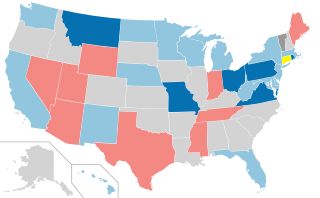
The 2006 United States Senate elections were held on November 7, 2006, with all 33 Class 1 Senate seats being contested. The term of office for those elected in 2006 ran from January 3, 2007, to January 3, 2013. Before the election cycle, the Republican Party controlled 55 of the 100 Senate seats.
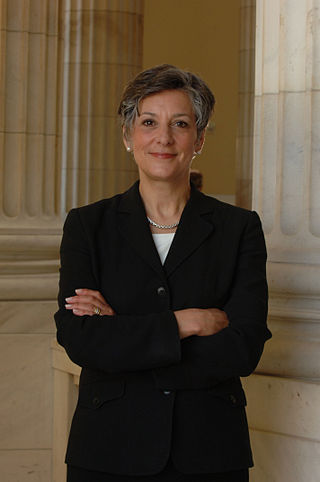
Allyson Schwartz is an American Democratic Party politician who represented parts of Montgomery County and Northeast Philadelphia in the United States House of Representatives from 2005 to 2015 and Northeast and Northwest Philadelphia in the Pennsylvania Senate from 1991 to 2005. She has finished second in a statewide Democratic Party primary twice: for United States Senate in 2000 and for Governor in 2014.
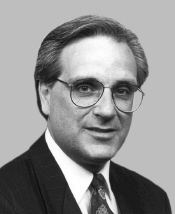
Ronald Paul Klink is an American television broadcaster and politician and who served four terms as a United States Representative from Pennsylvania from 1993 to 2001, as member of the Democratic Party.
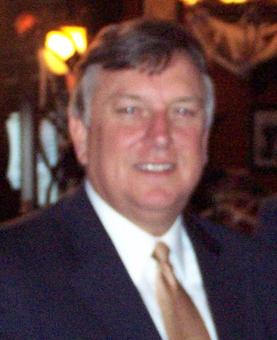
Mark Stephen Singel is an American politician who served as the 27th lieutenant governor of Pennsylvania from 1987 to 1995, alongside Governor Bob Casey. Singel served as the state's acting governor from June 14, 1993 to December 13, 1993, during Casey's lengthy battle with amyloidosis and subsequent multiple organ transplant.

The 2006 United States Senate election in Pennsylvania was held on November 7, 2006. Incumbent Republican Rick Santorum ran for re-election to a third term, but was easily defeated by Democratic State Treasurer Bob Casey, Jr., the son of former Governor Bob Casey Sr. Casey was elected to serve between January 3, 2007 and January 3, 2013.

The 2006 United States Senate election in Ohio was held November 7, 2006. Incumbent Republican Mike DeWine ran for re-election, but was defeated by Democratic congressman Sherrod Brown. As of 2024, this is the most recent time a Democratic Senate candidate in Ohio won a race by double digits.

The 2004 United States Senate election in Pennsylvania was held on November 2, 2004. Incumbent Republican Senator Arlen Specter won re-election to a fifth term. As of 2024, this is the last time a Republican statewide candidate won Montgomery and Delaware Counties and won more than 25% of the vote in Philadelphia. Specter later lost renomination in 2010 as a Democrat, having joined the party in April 2009. Specter’s party switch marked the first time since 1947 that Democrats held both of Pennsylvania’s U.S. Senate seats.

The 2010 United States Senate election in Utah took place on November 2, 2010, along with other midterm elections throughout the United States. Incumbent Republican U.S. Senator Bob Bennett was seeking re-election to a fourth term, but lost renomination at the Republican Party's state convention. Mike Lee proceeded to win the Republican primary against Tim Bridgewater and the general election against Democrat Sam Granato. As of 2024, this is the most recent U.S. Senate election in which a political party held the seat after denying renomination to the incumbent senator.
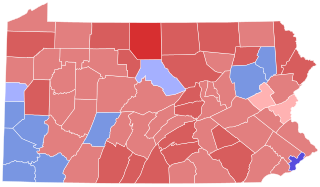
The 1994 United States Senate election in Pennsylvania was held November 8, 1994. Incumbent Democratic U.S. Senator Harris Wofford, who was appointed to the position in 1991 and won a special election the same year, sought re-election to a full six-year term, but he was defeated by Republican Rick Santorum. By a margin of 2.5%, this election was the second-closest race of the 1994 Senate election cycle, behind only the election in California.
Terry E. Van Horne was a former Democratic member of the Pennsylvania House of Representatives, where he represented the 54th legislative district.

The 2000 United States House elections in Pennsylvania was an election for Pennsylvania's delegation to the United States House of Representatives, which occurred as part of the general election of the House of Representatives on November 7, 2000.

Richard John Santorum is an American politician, attorney, author, and political commentator who represented Pennsylvania in the United States Senate from 1995 to 2007. He was the Senate's third-ranking Republican during the final six years of his tenure. He also ran unsuccessfully for president of the United States in the 2012 Republican primaries, finishing second to Mitt Romney.

The 2012 United States Senate election in Pennsylvania was held on November 6, 2012, alongside a presidential election, other elections to the United States Senate in other states, as well as elections to the United States House of Representatives and various state and local elections. Incumbent Democratic U.S. Senator Bob Casey, Jr. ran for and won re-election to a second term, defeating Republican nominee Tom Smith, and Libertarian nominee Rayburn Smith.

The 2012 United States presidential election in Pennsylvania took place on November 6, 2012, as part of the 2012 United States presidential election in which all 50 states plus the District of Columbia participated. The primary election to select the Democratic and Republican candidates had been held on April 24, 2012. Pennsylvania voters chose 20 electors to represent them in the Electoral College via a popular vote pitting incumbent Democratic President Barack Obama and his running mate, Vice President Joe Biden, against Republican challenger and former Massachusetts Governor Mitt Romney and his running mate, Congressman Paul Ryan. Pennsylvania's electoral vote number was a reduction from the 2008 delegation, which had 21 electors. This change was due to reapportionment following the 2010 United States Census. Pennsylvania's 20 electoral votes are allotted on a winner-take-all basis.

The 2014 Pennsylvania gubernatorial election was held on November 4, 2014, to elect the governor and lieutenant governor of Pennsylvania, concurrently with elections to the United States Senate in other states and elections to the United States House of Representatives and various state and local elections.

The 1988 United States Senate election in Pennsylvania was held on November 8, 1988. Incumbent Republican U.S. Senator John Heinz successfully sought re-election to another term, defeating Democratic nominee Joe Vignola.

The 2016 United States Senate election in Pennsylvania took place on November 8, 2016, to elect a member of the United States Senate to represent the Commonwealth of Pennsylvania, concurrently with the 2016 U.S. presidential election, as well as other elections to the United States Senate in numerous other states and elections to the United States House of Representatives and various state and local elections. The primaries were held on April 26. Incumbent Republican U.S. Senator Pat Toomey was reelected to a second term in a close race, defeating Democratic nominee Katie McGinty and Libertarian Party nominee Edward Clifford. With a margin of 1.43%, this election was the second-closest race of the 2016 Senate election cycle, behind only the election in New Hampshire.

The 2022 Pennsylvania gubernatorial election was held on November 8, 2022, to elect the governor and lieutenant governor of Pennsylvania. Democratic state attorney general Josh Shapiro defeated Republican state senator Doug Mastriano to win his first term in office. Shapiro succeeded Democratic incumbent Tom Wolf, who was term limited.























